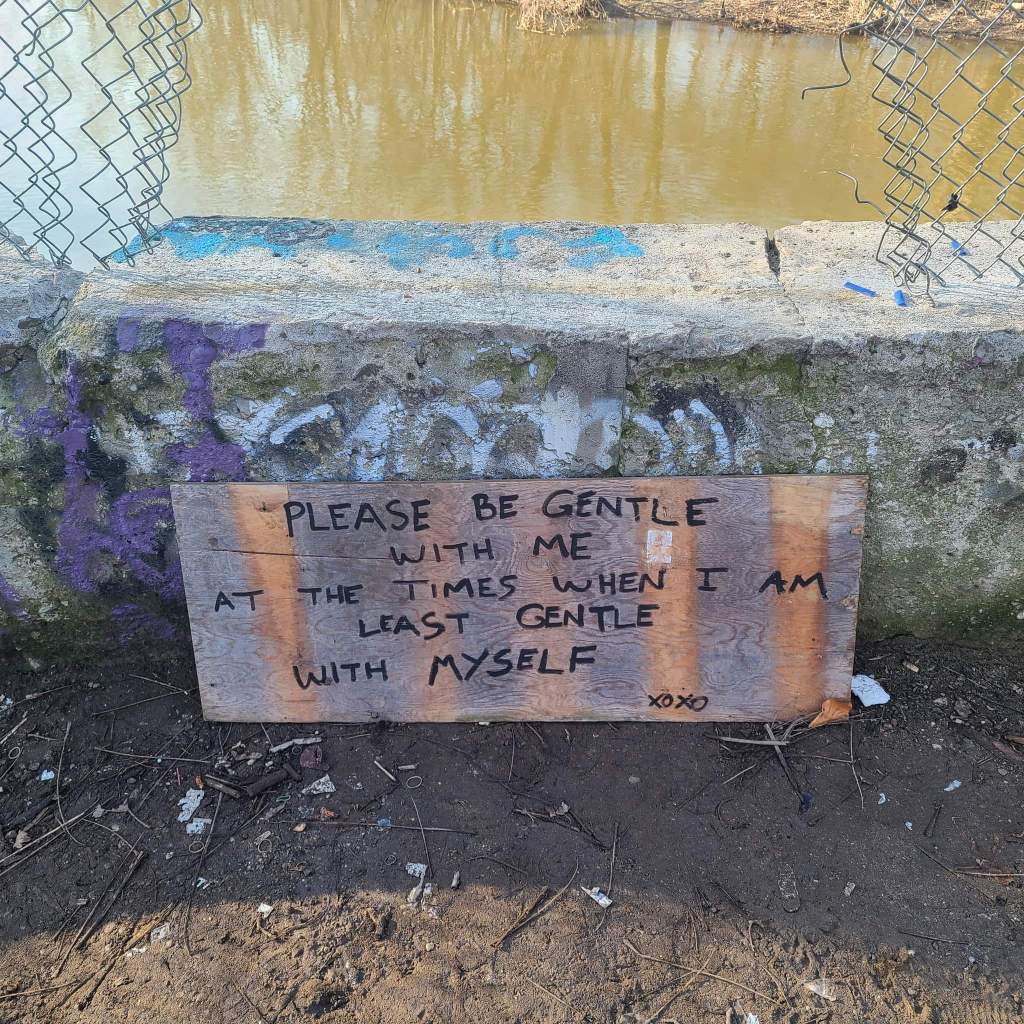It was 9pm on December 25th and we were closing down from our dinner drop-in. A lot of homeless folx don’t have anywhere to go on Christmas day. And nothing really reminds you of just how homeless you really are as hunkering down in a nest of wet blankets in a doorway while the temperature drops below freezing and the shop windows behind you glow with pictures of happy families eat turkey and opening presents. So, we stayed open on Christmas Day and the staff members who had the day off even stopped in with their families for awhile. Sometimes that’s the difference between being a member of a community and being a human resource in a workplace.
So, yeah, it was 9pm on December 25th and we were closing down, but I was on my back on the bathroom floor holding the hand of a man who had stopped breathing and collapsed in the stall.

I had spoken with him fifteen minutes before, but there’s some heavy shit going around and the person talking with you one minute is dead the next. So, there I was, looking for a pulse with one hand while grinding the knuckles of my other hand on his sternum and calling him back to himself. Thankfully, after what was probably only half a minute (although it felt much longer to me), he took a couple of deep rasping breaths and started breathing again. The colour returned to his face but I couldn’t get him to regain consciousness. I held his hands and spoke words of love to him while also trying to writhe under the door without pushing him around too much, so that I could unlock the stall and open it. There was an uncapped needle beside him—like I said, this shit hits fast and hard and I knew he would be terribly embarrassed to know his gear had spilled out of the stall if he came around—and I was just hoping there wasn’t anything else that might poke me as I squirmed through his stuff. It was a chance I was willing to take given that I wasn’t sure if he would continue to breathe or if I would be able to get him more completely back to himself. I couldn’t quite get the door latch (wtf…), so I lied back down on the floor beside the man and continued to try and wake him while holding his hand and telling him how much we love him, how much we appreciate him, how glad we always are to see him, and how grateful we are to share life together with him. A less experienced worker would probably have rushed to call 911 or would have Narcaned him already, but I could see he was breathing well and his pulse was normal and I knew he had been sleeping on concrete in parkades (getting shunted from one to the next every night by the corporate security guards because god forbid that we allow people to sleep in empty parking spots) and I knew he must have been exhausted and I knew that he thought that maybe he had pneumonia and I knew that he was freezing and I knew that he had just eaten a hot meal and came into a warm indoor space and I knew how hard I can be to wake when I get to that state of exhaustion (which I pretty much never do anymore because I’m not homeless anymore) and I also knew how hard he probably had to work to get the meds he injected to help medicate his broken-heart and weary body on Christmas Day. I didn’t want to ruin that for him and so, instead, I took the time he needed to wake up. Because sometimes the difference between a community and a workplace is not rushing everyone out into the night the minute you close. So, we took the time he needed to wake up. And he woke up, got dressed, got some leftovers and blankets for the road, profusely expressed his gratitude, and left.
Anyone who stays in this work long enough tends to develop their own superstitions. The oppression is so thick and so immediately death-dealing, that we all go at least a little mad here. If you’re lucky, you can find a way to go mad that makes you more kind instead of more cruel, more engaged instead of more disconnected, and more tender-hearted instead of more apathetic. But, yeah, that does take a fair bit of luck. One of my superstitions is that love words can call people back to life when they are situated in that first grey area between life and death. Maybe their lungs and heart have stopped but their brain isn’t dead yet. It’s as if the spirit and body are rupturing but somehow still connected. The body cannot hear anymore but the spirit is still close enough that I think maybe it can. Don’t get me wrong, I’ll still do CPR and use Narcan and call 911 and rub sternums and do the Heimlich and all those other things, but I’ve been in enough situations where someone has only just died (or only just stopped breathing, or only just had their heart stop beating), and I’ve seen how they respond to love when they did not respond to anything else, and maybe that’s just a coincidence and maybe it’s not… but that maybe is enough for me. And, for me, this is a good way to go mad.
I also think words of love can help people die well. I remember going to see my friend, Joe, when he was on life support in the ICU and had tubes running in and out of his neck and in and out of his arms and his prosthetic leg was propped beside the bed and he looked just like Jesus after he was taken down from the cross. I told him then how much I loved him, how much I appreciated him, how glad I always was to see him, how grateful I was to share life together with him, and I reminisced about some of my favourite memories with him. And then I told him it was okay to let go of the broken and crucified body to which he was still tethered. And I told him I would miss him but that it was okay to lay down all his pain and sorrow and weariness and find rest. And I said thank you so much for carrying what you carried and thank you so much for putting it down now, and I love you and goodbye, Joe, and thanks so much for everything. And the next day they pulled the plug, and I like to believe, in my own mad way, that the words of love I spoke helped him to fare well. There are magic words after all. Vulnerable, tenderhearted words of love spoken from one heart to another—even though you feel exposed and awkward and embarrassed for speaking them—can do things that nothing else can.
I was still young and new to this community and this vocation when I learned this lesson. I was twenty years old and working an overnight shift at a men’s shelter in Toronto, when I found a man standing in the stairwell at 3am. He was standing and conscious and staring and frozen and no matter what I said or did, he would neither move nor respond in any way. I didn’t know what to do and so we called 911 and while we waited for the ambulance to arrive, I spoke to the man. I told him I didn’t know if he could hear me, but help was on the way. I told him I was sorry for what he had gone through that had brought him to this place and I told him that we loved him and cared about him and were going to do everything we could to not abandon him but to, instead, get him help that would be meaningful to him. I called him my brother and I meant it. I let him know that I would remain with him and we would, as best we could, get through this together. And then the ambulance came and they carried him onto a stretcher—he was still completely frozen although his eyes remained open the whole time—and took him to the hospital.
When I came in to work the following night, the man was back at the shelter and he was back to moving and communicating. He pulled me aside and thanked me for what I said to him. He said he was in psychosis and was absolutely petrified with terror but he could hear every word that I said and he said it comforted him and reassured him, even though he could give no sign of having heard me. It was a profoundly moving experience for both of us. And I have continued to speak vulnerable, tenderhearted love words from my heart to the hearts of others—even though I feel exposed and awkward and embarrassed for speaking so intimately with people I don’t always know so well—because this man took the time to say thank you and to let me know how my words affected him. So, if we want to talk about “best practices” based upon the collective wisdom of those with “lived and living experience,” then surely one of those practices is speaking awkward, loving words from our unveiled, whole hearts at the times when the hearts of others are the closest to giving up.

Much love to you all, dear friends.
Dan
Much love, Daniel.
Thank you Daniel!